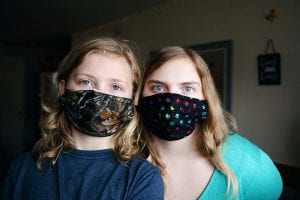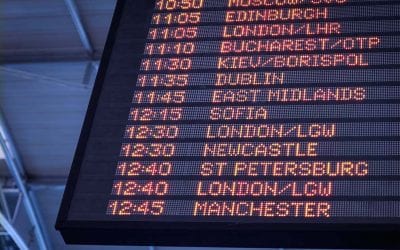Will fewer passengers be wearing masks because of CDC exclusions making passengers less safe?

Since then, US COVID cases surpassed 26.9 million and deaths increased to more than 462,000. That’s despite the US now having more than 9 million fully vaccinated people. Face masks are needed more than ever to control COVID transmission to the extent possible.
Until the CDC order, United Airlines, American Airlines and Southwest Airlines required everyone two years old and up, flying on their planes, to wear a face mask. They allowed no exceptions. Delta Air Lines allowed a health exception in consultation with a health professional at the airport and were somewhat lax when enforcing the rule on young children.
The airlines regularly had a few passengers who refused to wear face masks. Sometimes there were ugly confrontations when flight crews attempted to enforce the face mask rules. The airlines have banned more than 2,500 passengers for refusing to wear a face mask during the pandemic.
The CDC mandatory face mask order puts the weight of the federal government behind the requirement.
By their mandatory face mask order, the CDC put the weight of federal law behind the mask requirement. Now, flight crew members can tell passengers they must wear a face mask under penalty of federal law.
The CDC order allows people to remove their masks briefly for eating, drinking and taking medication, as well as in other specific circumstances, just like the airlines had permitted. Problems with the CDC order are that in addition to the necessary mask exceptions, it adds disability mask exceptions that includes health problems.
Three issues must be considered about healt and disabilitiy mask exemptions to the mandatory face mask order during the pandemic.
There is no way to be reasonably certain that all passengers without masks won’t be infected with COVID-19.

In the American College of Physicians’ Annals of Internal Medicine (AIM), a study of false negative rates of PCR testing of COVID-19 (SARS-CoV-2) was published in August, 2020. The purpose of the study was to “estimate the false-negative rate by day since infection.” The study estimated that during the four days of infection prior to symptoms occurring, typically the fifth day, the probability of getting a false negative test result ranged from 100 percent on day 1 to a mean of 67 percent on day 4. Even on day 5, when most people infected with COVID begin to exhibit symptoms, the mean false negative rate is still 38 percent. It doesn’t drop to 20 percent until the eighth day. Rapid Antigen testing produces a higher false negative rate than PCR testing.
Negative COVID test results are inaccurate as much as 20 percent of the time.
A negative COVID test result is inaccurate up to 20 percent of the time. In addition, a passenger could contract the virus and be infectious after having taken the test. With planes filling up more and more, one must question if it makes sense to grant a disability exception for face masks during a pandemic, particularly for long flights.
READ ALSO:
Travelers United supports a facemask mandate and no domestic testing
Senators plan to improve passenger confidence on planes
Studies show that even people with severe COPD can safely wear face masks.
The CDC order permits airlines to require a medical profession review exemption requests and provide documentation before a face mask exemption could be granted. While that might seem to eliminate concern about the passenger’s need for an exemption, I question how diligent medical professionals will be with long time patients begging for an exemption. For example, there are studies that show virtually no one needs a mask exemption due to breathing capabilities. For example, a study conducted by researchers at Florida hospitals, published in the prestigious Annals of the American Thoracic Society in September, 2020, concluded that even people with severe COPD can safely wear face masks. In fact, experts emphasize that discomfort from face masks shouldn’t turn into unfounded health concerns.
In addition, many doctors argue that the very people who would request medical exemptions to fly without a mask are the very people who should be wearing a face mask due to their increased susceptibility to COVID and a severe case potential if infected.
There is concern that exemptions will be abused by air travelers much like they were abused for emotional support animal rules.
There is also a great deal of concern that exemptions will be abused by air travelers, much the same way emotional support and service animal rules have been abused. Many foresee fake medical exemption letters and certificates used by passengers much the same way fake documentation has been provided to bring these animals on flights.
I think it’s clear that the CDC mandatory face mask order is ill conceived and ultimately is less stringent than the face mask rule adopted by the airlines in 2020. It will not keep passengers as safe as possible during the COVID pandemic. The disability exemptions will cause more travelers to fly without masks, making flights less safe. The CDC needs to reconsider if the disability exemption is actually appropriate during the pandemic, in the best interest of travelers generally and particularly for the travelers with health disability problems.
After many years working in corporate America as a chemical engineer, executive and eventually CFO of a multinational manufacturer, Ned founded a tech consulting company and later restarted NSL Photography, his photography business. Before entering the corporate world, Ned worked as a Public Health Engineer for the Philadelphia Department of Public Health. As a well known corporate, travel and wildlife photographer, Ned travels the world writing about travel and photography, as well as running photography workshops, seminars and photowalks. Visit Ned’s Photography Blog and Galleries.



